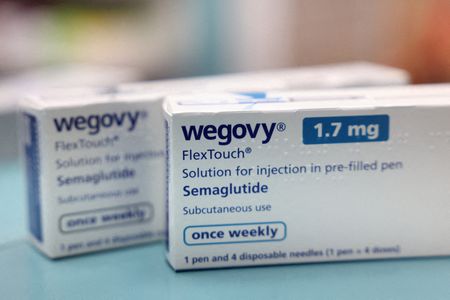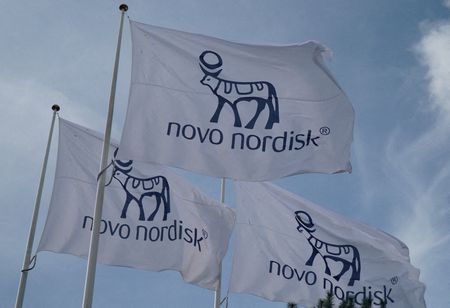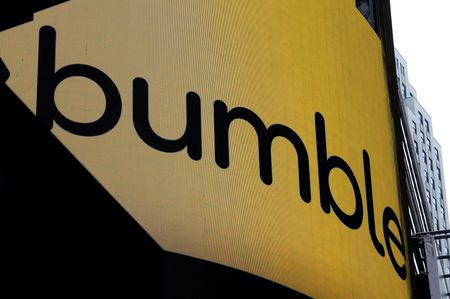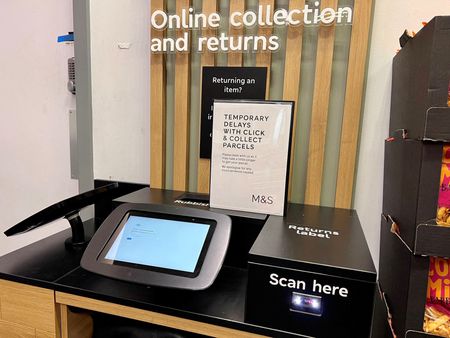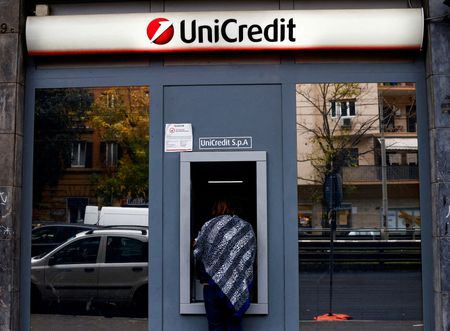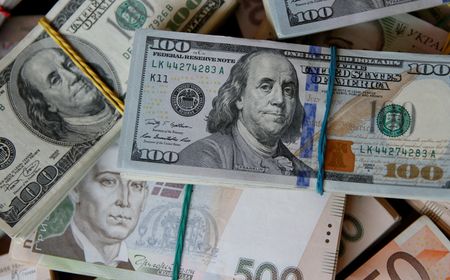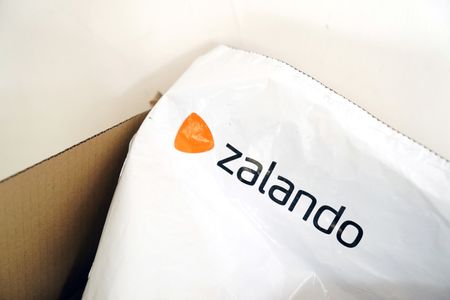By Jacob Gronholt-Pedersen and Maggie Fick
COPENHAGEN/LONDON (Reuters) -Drugmaker Novo Nordisk expects Wegovy weight-loss drug sales in the United States to start to recover once a ban on compound copycats is enforced this month, its CEO said on Wednesday after the company cut its 2025 forecasts.
U.S. pharmacies that have been allowed to produce compounded copies of Wegovy and Ozempic due to a shortage of supply have been given until May 22 to stop, following a review by the U.S. Food and Drug Administration (FDA).
Compounders copy brand-name medicines by combining, mixing or altering drug ingredients.
Booming sales of Wegovy helped to make Novo the most valuable listed company in Europe, worth $615 billion at its peak, but its market value has halved to about $310 billion since peaking in June last year.
Prescriptions in the United States, its biggest market, have not grown since February despite Novo having increased supplies.
“Growth is expected to pick up in the second-half of the year,” CEO Lars Fruergaard Jorgensen said on a call with journalists.
Investors have been concerned that Novo’s first-to-market drug is losing its lead to Eli Lilly, whose U.S. prescriptions for its Zepbound obesity shot have surpassed Wegovy since mid-March.
Novo Nordisk said first-quarter sales of Wegovy were 17.36 billion Danish crowns ($2.64 billion), declining 13% from the previous quarter, and below the 18.7 billion crowns expected by analysts.
“Over the summer, it’s going to be put up or shut up for Wegovy,” Barclays’ analyst Emily Field said on CNBC. “Either prescriptions come back, or people are going to assume that Eli Lilly is going to take this whole market.”
On a call with analysts, Novo executives said the company had a strategy for winning the market share currently held by compounding pharmacies.
Novo’s shares were 3.4% higher at 1300 GMT.
Novo estimates that around one-third of the U.S. obesity drug market has been “captured” by compounding pharmacies, CEO Jorgensen said.
He said this had “dampened” the company’s growth in the key U.S. market. “It’s unprecedented in our industry to have very large volumes of products flowing to patients that are not approved,” he said. “We were really surprised about that.”
Jorgensen also said sales would benefit from a decision by the largest pharmacy benefit management unit in the U.S., CVS Health, to drop Zepbound from some lists of medicines it covers for reimbursement.
POTENTIAL NEW TARIFFS LOOM
Novo has launched Wegovy in three countries within the last month, bringing the total to 25 countries, and said it would further accelerate launches having removed supply constraints.
Still, the Danish company on Wednesday cut its 2025 sales and profit forecasts for the first time since the launch of Wegovy four years ago.
It now expects 2025 sales growth in local currencies of between 13% and 21%, compared to the 16%-24% range given at the beginning of the year and operating profit growth of between 16% and 24% this year, compared to previous guidance of between 19% and 27%.
Novo shareholder, Markus Manns, portfolio manager at mutual funds firm Union Investment, said: “The guidance cut was widely expected and is seen as a clearing event and people are hoping for a sales inflection in June from the exit of compounders and in July from the preferred CVS formulary status.”
While the U.S. tariffs currently in place did not have a material effect on Novo’s outlook, potential new tariffs on pharmaceuticals imposed by President Donald Trump could have a negative impact, the company said.
Novo reported first-quarter earnings before interest and taxation of 38.79 billion crowns, compared with the 37.20 billion forecast in a company-compiled consensus based on 26 analysts and up 22% from a year ago.
($1 = 6.5675 Danish crowns)
(Reporting by Jacob Gronholt-Pedersen and Maggie Fick, editing by Terje Solsvik, Barbara Lewis, Elaine Hardcastle)

